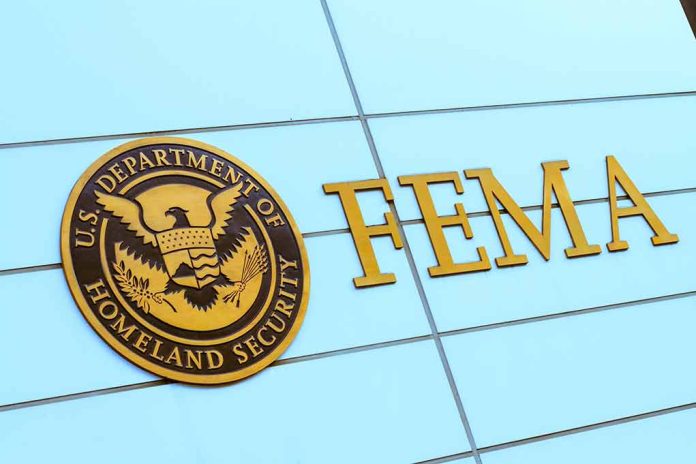
FEMA’s mismanagement of COVID-19 grants has led to billions in wasteful spending, raising serious questions about the agency’s ability to handle emergencies effectively.
Top Takeaways
- FEMA potentially mismanaged almost $10 billion in COVID-19-related grants from 2020 to 2023.
- A $1.1 billion grant was supported by only one sheet of paper without itemized costs.
- FEMA overobligated at least $1.5 billion for a state’s medical staffing grant.
- The agency failed to validate cost estimates or determine cost reasonableness before obligating funds.
- FEMA’s streamlined reimbursement process during the pandemic led to less oversight and more fraudulent spending.
Billions Wasted: FEMA’s COVID-19 Grant Mismanagement
The Federal Emergency Management Agency (FEMA) is under intense scrutiny following a damning report by the Department of Homeland Security Inspector General. The audit, covering the period from 2020 to 2023, reveals that FEMA mismanaged nearly $10 billion in COVID-19-related grants, highlighting serious deficiencies in the agency’s processes for allocating and validating emergency funds.
One of the most alarming findings is that FEMA approved a staggering $1.1 billion grant supported by only a single sheet of paper, lacking any itemized costs. This level of negligence in documentation and oversight is not just concerning; it’s a blatant disregard for proper fiscal management of taxpayer money.
🚨#BREAKING: A SHOCKING audit of FEMA has uncovered that the agency:
"Mismanaged $10 BILLION DOLLARS that could have been put to better use for disasters…"
This comes hours after DOGE discovered that $59,000,000 payments were still being made to hotels for illegal migrants. pic.twitter.com/UGj2jiTYCT
— Matt Van Swol (@matt_vanswol) February 12, 2025
Lack of Oversight and Fraudulent Spending
The Department of Homeland Security’s Office of Inspector General (OIG) report uncovered widespread waste, fraud, and abuse at FEMA. The agency’s streamlined reimbursement process during the pandemic, while intended to expedite aid, actually led to less oversight and more fraudulent spending. FEMA failed to validate cost estimates or determine cost reasonableness before obligating funds, resulting in questionable spending amounting to $8.1 billion due to improper vetting.
In a shocking revelation, some FEMA staff were instructed not to conduct thorough reviews of project eligibility. This lax approach to grant management has not only wasted valuable resources but also undermined FEMA’s disaster response capability. The OIG made seven recommendations to FEMA, with five considered “open and resolved” and two “open and unresolved,” indicating that significant work remains to address these issues.
A History of Mismanagement
Unfortunately, this is not an isolated incident. FEMA has been criticized for mismanaging tens of billions of dollars over the years. The newly established Department of Government Efficiency (DOGE), led by Elon Musk, has been tasked with analyzing FEMA’s spending. Their findings have been equally troubling, uncovering instances of unauthorized payments and violations of presidential orders.
The Trump administration has been highly critical of FEMA, calling for a complete overhaul of the agency. The mismanagement and haphazard project approvals have not only depleted FEMA’s resources but also endangered Americans by leaving the agency ill-prepared for future disasters.
Consequences and Calls for Reform
The consequences of FEMA’s mismanagement are far-reaching. During the 2023 hurricane season, the agency faced criticism for insufficient funds to handle imminent needs. An August 2024 audit found $7 billion in unliquidated funds due to improper processes, further highlighting the systemic issues within the agency.
As the full extent of FEMA’s mismanagement comes to light, there are growing calls for significant reforms in its operational frameworks. The agency’s focus on “equity” as its top strategic goal has been criticized, with many arguing that it has come at the expense of effective disaster management and responsible stewardship of taxpayer funds. The American people deserve better from an agency tasked with responding to national emergencies, and it’s clear that substantial changes are needed to restore trust and efficiency in FEMA’s operations.






















